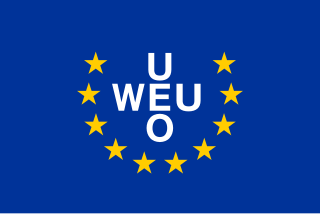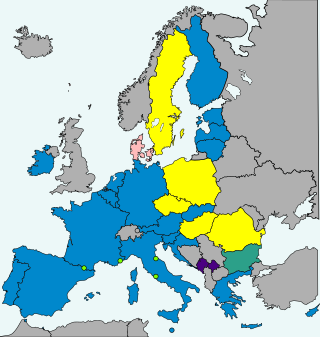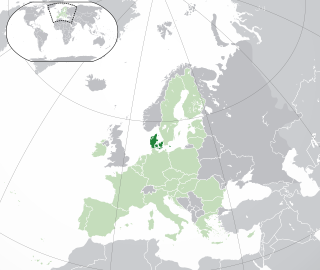
The Treaty on European Union, commonly known as the Maastricht Treaty, is the foundation treaty of the European Union (EU). Concluded in 1992 between the then-twelve member states of the European Communities, it announced "a new stage in the process of European integration" chiefly in provisions for a shared European citizenship, for the eventual introduction of a single currency, and for common foreign and security policies, and a number of changes to the European institutions and their decision taking procedures, not least a strengthening of the powers of the European Parliament and more majority voting on the Council of Ministers. Although these were seen by many to presage a "federal Europe", key areas remained inter-governmental with national governments collectively taking key decisions. This constitutional debate continued through the negotiation of subsequent treaties, culminating in the 2007 Treaty of Lisbon.

The Western European Union was the international organisation and military alliance that succeeded the Western Union (WU) after the 1954 amendment of the 1948 Treaty of Brussels. The WEU implemented the Modified Brussels Treaty. During the Cold War, the Western Bloc included the WEU member-states, plus the United States and Canada, as part of the North Atlantic Treaty Organization (NATO).

The Treaty of Nice was signed by European leaders on 26 February 2001 and came into force on 1 February 2003.

The European Communities (EC) were three international organizations that were governed by the same set of institutions. These were the European Coal and Steel Community (ECSC), the European Atomic Energy Community, and the European Economic Community (EEC); the last of which was renamed the European Community (EC) in 1993 by the Maastricht Treaty establishing the European Union. The European Union was established at that time more as a concept rather than an entity, while the Communities remained the actual subjects of international law impersonating the rather abstract Union, becoming at the same time its first pillar. In the popular language, however, the singular European Community was sometimes inaccurately used interchangeably with the plural phrase, in the sense of referring to all three entities.

The Single European Act (SEA) was the first major revision of the 1957 Treaty of Rome. The Act set the European Community an objective of establishing a single market by 31 December 1992, and a forerunner of the European Union's Common Foreign and Security Policy (CFSP) it helped codify European Political Co-operation. The amending treaty was signed at Luxembourg City on 17 February 1986 and at The Hague on 28 February 1986. It came into effect on 1 July 1987, under the Delors Commission.

Between 1993 and 2009, the European Union (EU) legally comprised three pillars. This structure was introduced with the Treaty of Maastricht on 1 November 1993, and was eventually abandoned on 1 December 2009 upon the entry into force of the Treaty of Lisbon, when the EU obtained a consolidated legal personality.
- The European Communities pillar handled economic, social and environmental policies. It comprised the European Community (EC), the European Coal and Steel Community, and the European Atomic Energy Community (EURATOM).
- The Common Foreign and Security Policy (CFSP) pillar took care of foreign policy and military matters.
- Police and Judicial Co-operation in Criminal Matters (PJCCM) brought together co-operation in the fight against crime. This pillar was originally named Justice and Home Affairs (JHA)

The Common Security and Defence Policy (CSDP) is the European Union's (EU) course of action in the fields of defence and crisis management, and a main component of the EU's Common Foreign and Security Policy (CFSP).

This is a list of referendums related to the European Union, or referendums related to the European Communities, which were predecessors of the European Union. Since 1972, a total of 48 referendums have been held by EU member states, candidate states, and their territories, with several additional referendums held in countries outside the EU. The referendums have been held most commonly on the subject of whether to become a member of European Union as part of the accession process, although the EU does not require any candidate country to hold a referendum to approve membership or as part of treaty ratification. Other EU-related referendums have been held on the adoption of the euro and on participation in other EU-related policies.

The Petersberg Declaration was adopted by ministers of the Western European Union on 19 June 1992 at Hotel Petersberg, near Bonn in Germany. It defined military tasks of a humanitarian, disarming, peacekeeping and peacemaking nature that the WEU would be empowered to do. The contents and responsibilities arising from the declaration, known as the Petersberg Tasks, were later transferred to the European Union's (EU) European Security and Defence Policy (ESDP), presently known as the Common Security and Defence Policy (CSDP).

Denmark uses the krone as its currency and does not use the euro, having negotiated the right to opt out from participation under the Maastricht Treaty of 1992. In 2000, the government held a referendum on introducing the euro, which was defeated with 53.2% voting no and 46.8% voting yes. The Danish krone is part of the ERM II mechanism, so its exchange rate is tied to within 2.25% of the euro.

This is a timeline of European Union history and its previous development.

A referendum on the Maastricht Treaty for the founding of the European Union was held in Denmark on 2 June 1992. The treaty was rejected by 50.7% of voters with a turnout of 83.1%. This meant a serious hurdle on the way in the process of further European integration, which nevertheless did continue because all twelve memberstates did want to ratify.

In general, the law of the European Union is valid in all of the twenty-seven European Union member states. However, occasionally member states negotiate certain opt-outs from legislation or treaties of the European Union, meaning they do not have to participate in certain policy areas. Currently, three states have such opt-outs: Denmark, Ireland and Poland. The United Kingdom had four opt-outs before leaving the Union.

Denmark holds opt-outs from European Union policies in relation to police and justice and the adoption of the euro. They were secured under the Edinburgh Agreement in 1992 after a referendum for the ratification of the Maastricht Treaty was rejected by Danish voters, as a package of measure to assuage concerns raised during that referendum.

The Permanent Structured Cooperation (PESCO) is the part of the European Union's (EU) security and defence policy (CSDP) in which 26 of the 27 national armed forces pursue structural integration. Based on Article 42.6 and Protocol 10 of the Treaty on European Union, introduced by the Treaty of Lisbon in 2009, PESCO was first initiated in 2017. The initial integration within the PESCO format is a number of projects which launched in 2018.

Denmark in the European Union refers to the historical and current issues of Denmark's membership in the European Union (EU). Denmark has a permanent representation to the EU in Brussels, led by ambassador Jonas Bering Liisberg.

The Treaties of the European Union are a set of international treaties between the European Union (EU) member states which sets out the EU's constitutional basis. They establish the various EU institutions together with their remit, procedures and objectives. The EU can only act within the competences granted to it through these treaties and amendment to the treaties requires the agreement and ratification of every single signatory.

This article outlines the history of the Common Security and Defence Policy (CSDP) of the European Union (EU), a part of the Common Foreign and Security Policy (CFSP).

The European Union (EU) and the North Atlantic Treaty Organisation (NATO) are two main treaty-based Western organisations for cooperation between member states, both headquartered in Brussels, Belgium. Their natures are different and they operate in different spheres: NATO is a purely intergovernmental organisation functioning as a military alliance, which serves to implement article 5 of the North Atlantic Treaty on collective territorial defence. The EU on the other hand is a partly supranational and partly intergovernmental sui generis entity akin to a confederation that entails wider economic and political integration. Unlike NATO, the EU pursues a foreign policy in its own right—based on consensus, and member states have equipped it with tools in the field of defence and crisis management; the Common Security and Defence Policy (CSDP) structure.

A referendum on the abolition of the defence opt-out, one of the country's opt-outs from the European Union, was held in Denmark on 1 June 2022. The referendum was announced on 6 March 2022 following a broad multi-party defence agreement reached during the 2022 Russian invasion of Ukraine. The referendum resulted in the "Yes" side winning with approximately two-thirds of the vote.



















